THE 4AD FOREST
When a live music venue decides to plant a forest in order to compensate the CO2 emissions related to its activities.
In 2014, as the 4AD Muziekclub received for the third time the «Charter Duurzaam Ondernemen» (West Flanders Sustainable Entrepreneurship Charter) they aimed to become the first cultural organisation in Flanders to be CO2 neutral.
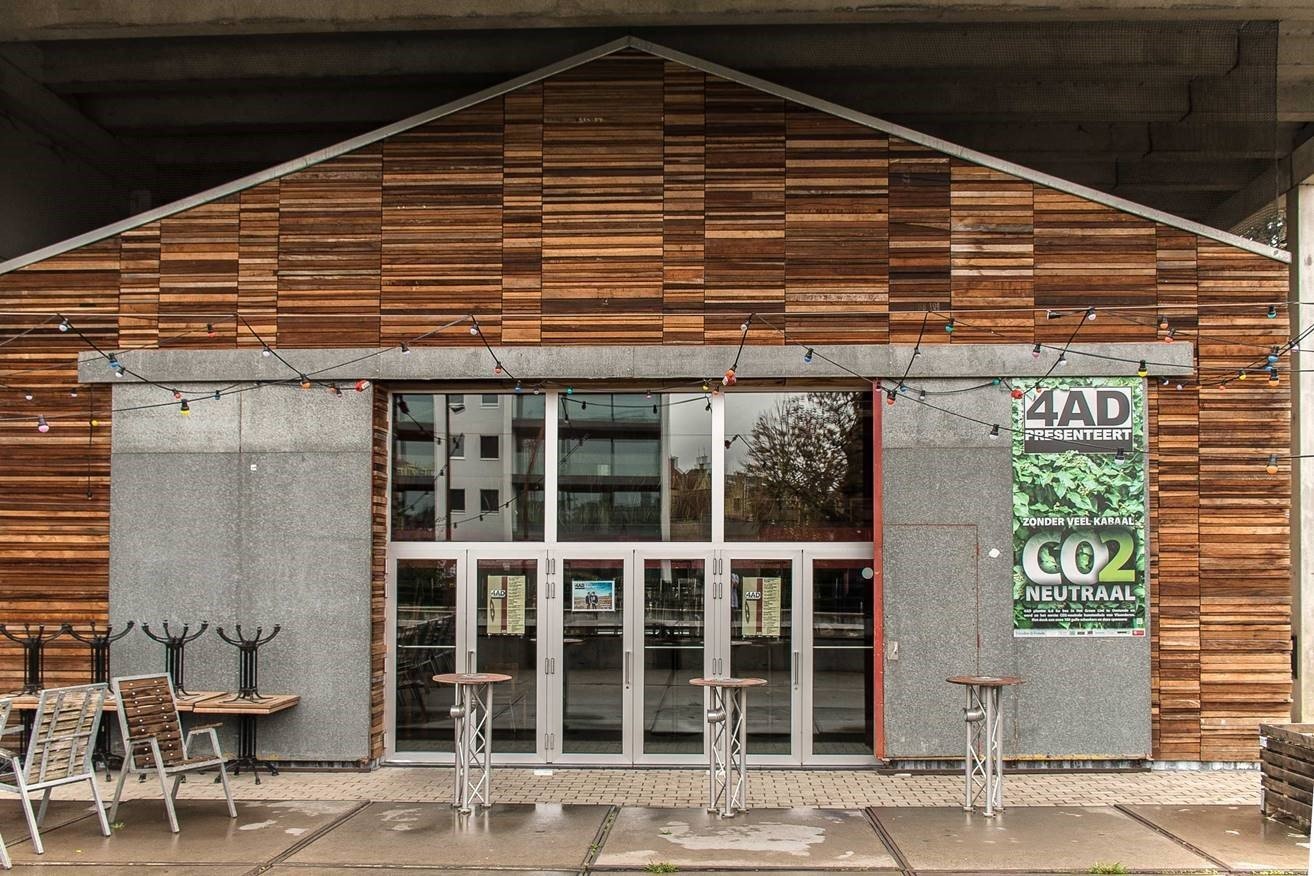
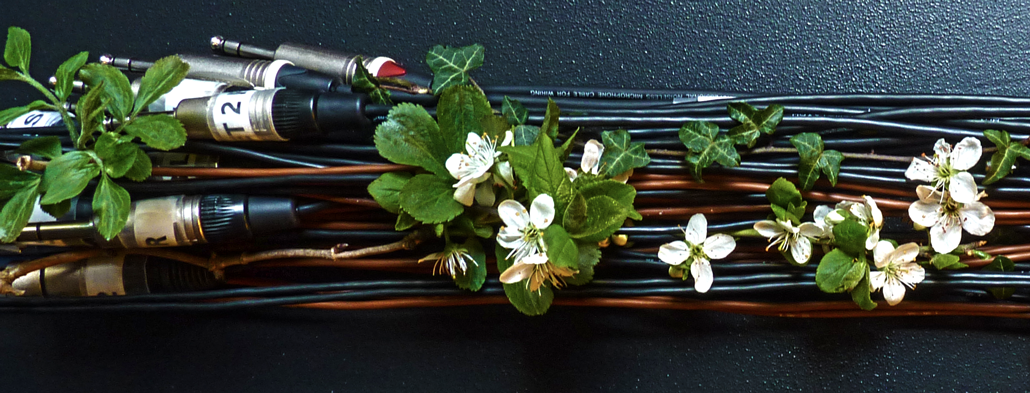
“4AD aims to be a warm, ecological and socially engaged music club developing activities accessible to everyone.”
(Extract of their Mission Statement)
The 4AD music club has established sustainable practices such as:
-
in the 4AD hotel, the artists sleep on beds made from recuperation material
-
the café uses second-hand tables and chairs, originally from a football canteen
-
the 4AD in-house chefs consciously serve artists vegetarian meals
-
4AD has been offering fair trade products since the mid-1990s
-
in 1999 they were the first club to replace disposable plastic cups for re-usable cups
In 2005, they took further steps in making their live music club sustainable:
- 4AD is a building inside a building: the original shed has been 100% recycled and the concrete dome on the outside ensures optimum (acoustic) insulation
- two rain cages of 20,000 liters ensure the reuse of rainwater
- 34 solar panels were installed on the roof
- in October 2010, 4AD opted for LED stage lights
- an eco-coach and team were appointed in 2013, responsible for the annual Eco Day with repair café, swishing, eco-workshops ...
- furnishing their own herb garden with a hotel for insects
- Since 2011, Muziekclub 4AD has been a member of the Sustainable Entrepreneurship Charter, a control body and an impetus for a sustainable organizational policy.
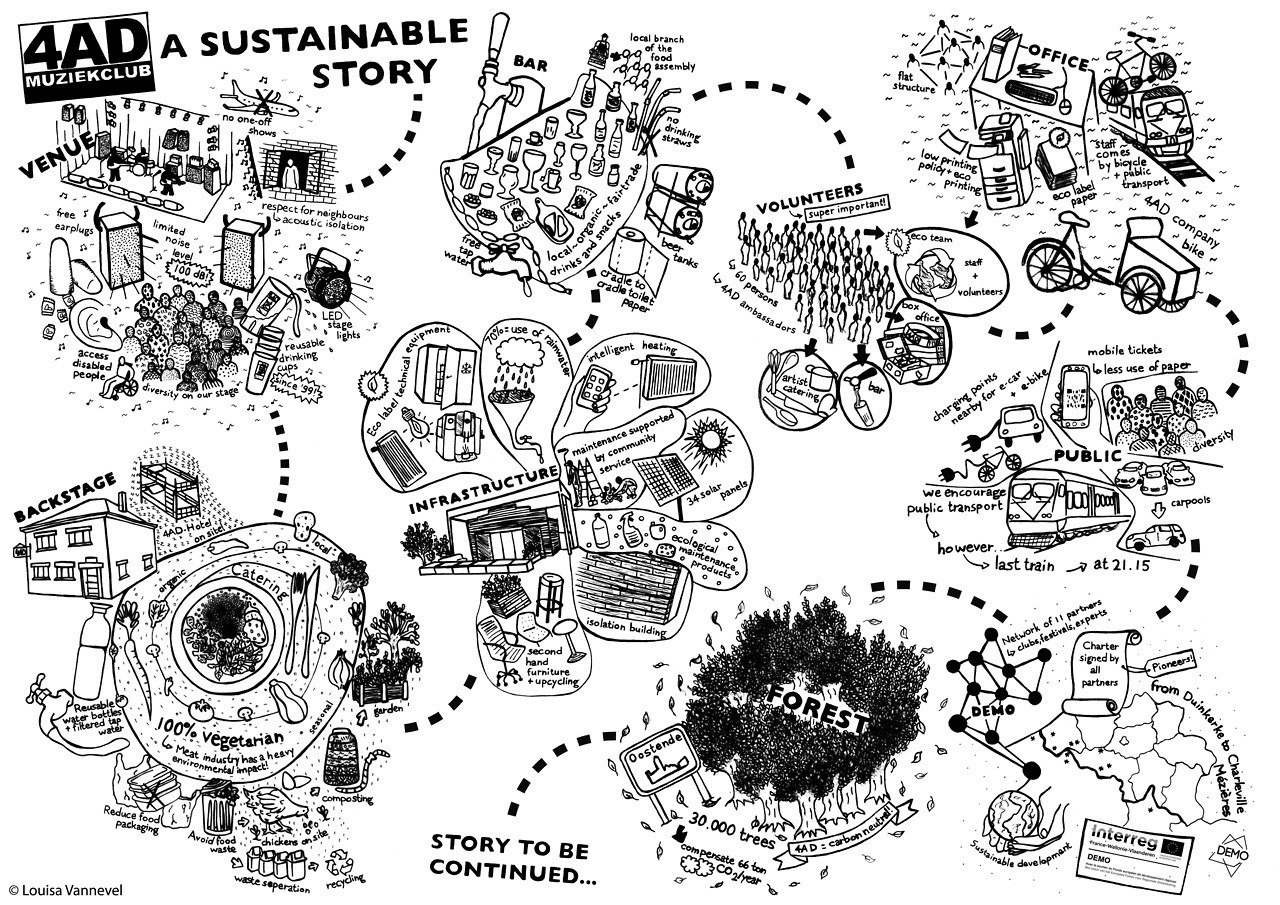
Despite these initiatives, the 4AD Music Club discovered that they emit 66 tonnes of CO2 each year.
The mobility of the audience is responsible for 90% of those emissions: the 4AD club is in a rural region not accessible by public transport.
That is why 4AD challenged themselves to become the first CO2-neutral arts house in Flanders.
And decided to plant 16,5 acres of forest in the direct vicinity of the 4AD Muziekclub to compensate for the CO2 emissions.
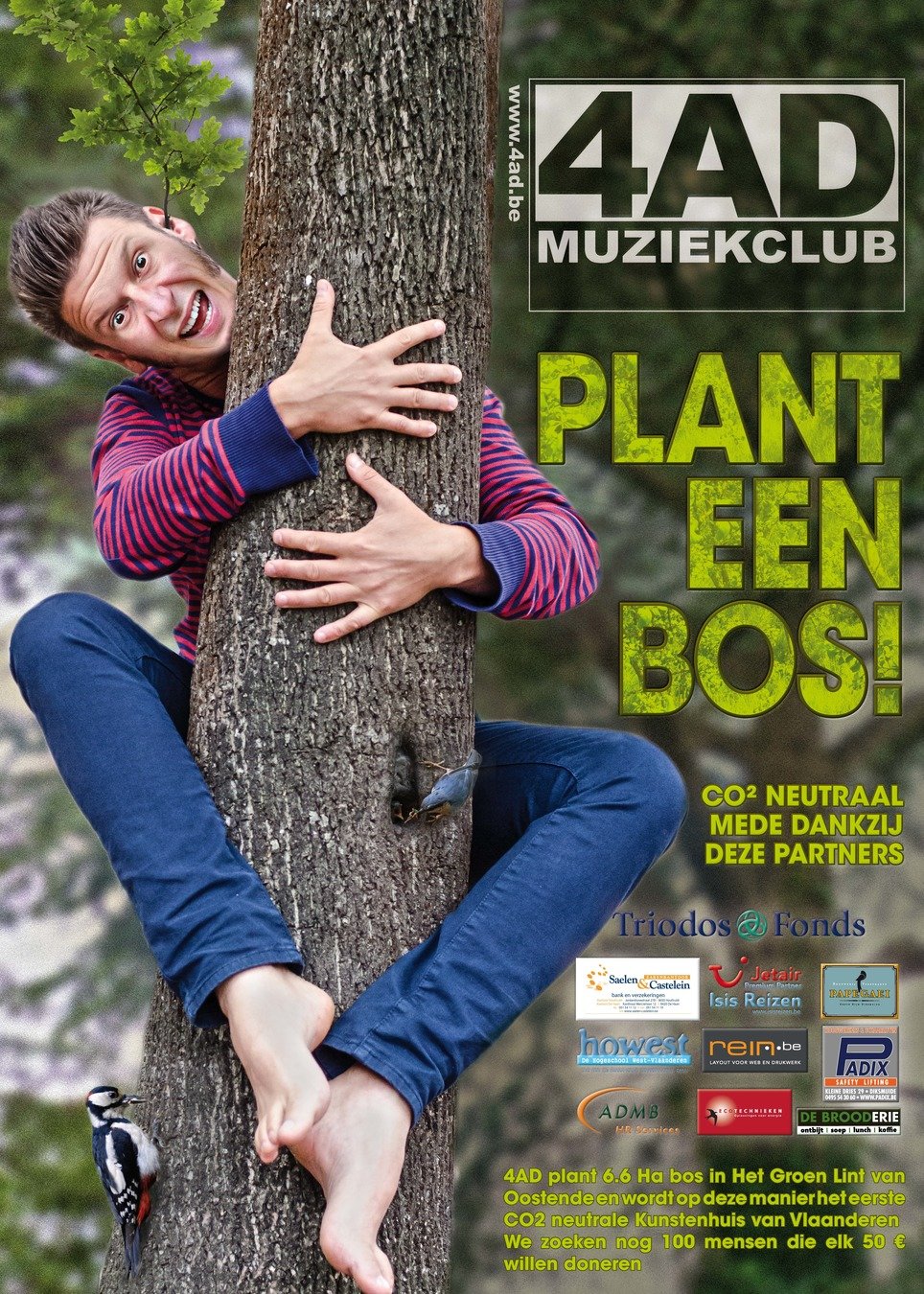
"From ecological cleaning products, through solar panels, to the 4AD forest: 4AD is committed to continue to investigate how our emissions can be further reduced and compensated.
Because as individuals, organisations or companies, we all play a role in the future of our planet."
- The 4AD team
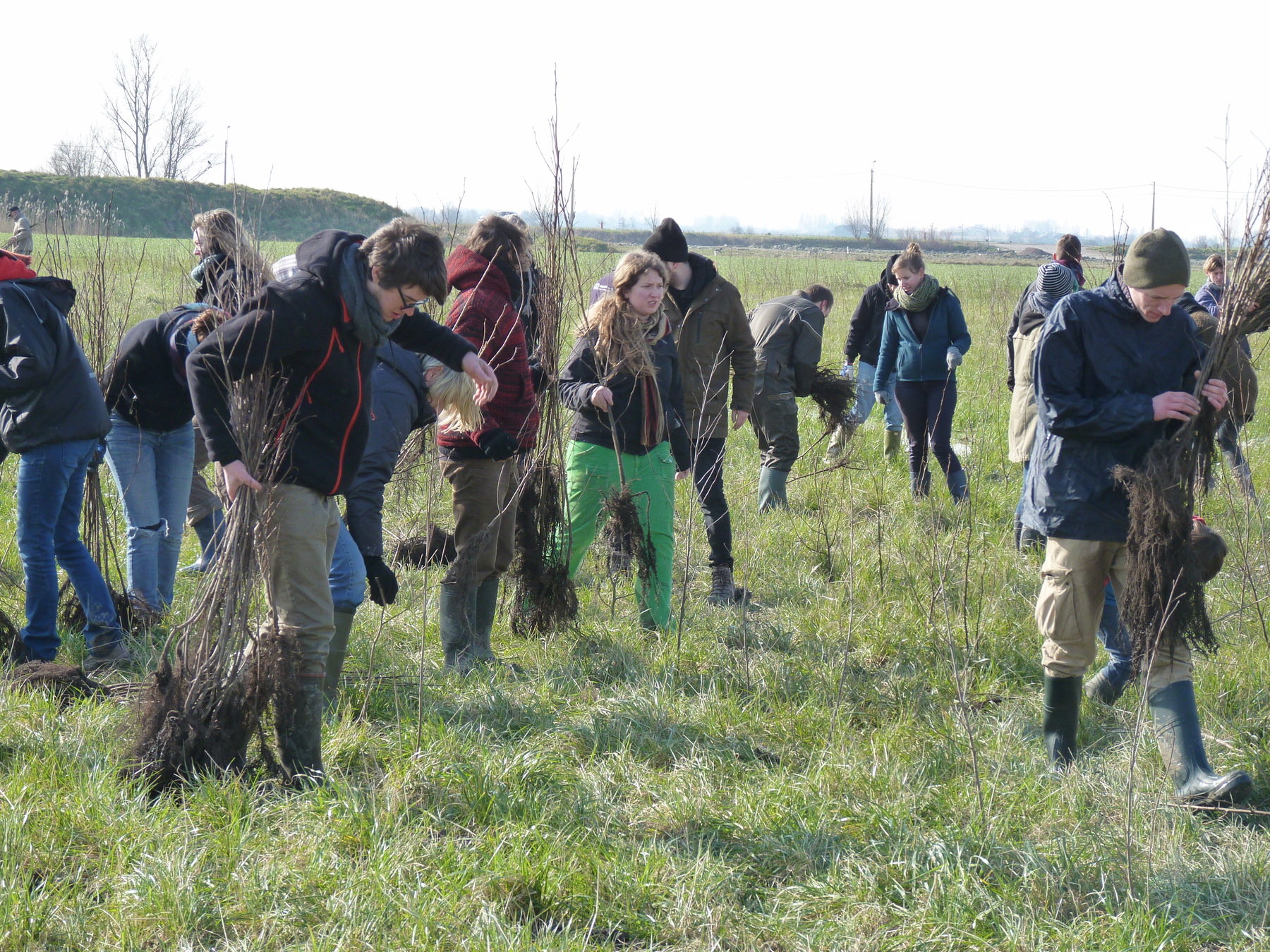
The forest is located in the Groen Lint in Ostende, 10 miles away from the 4AD Muziekclub.
The plantation started in February 2016. The forest will take 40 years to grow.
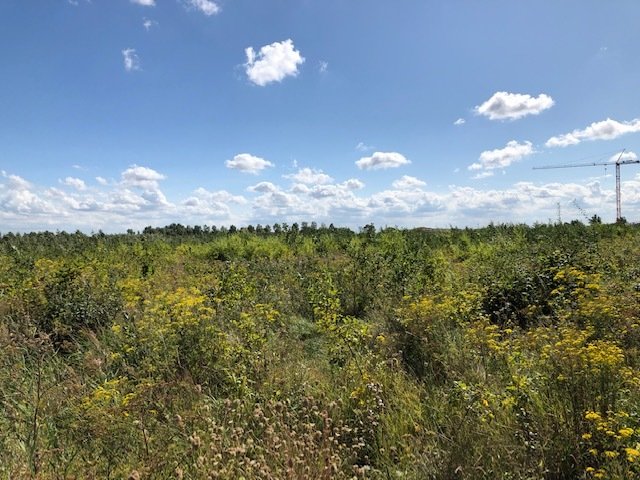
The forest in 2019
Why a forest?
- is eye-catching
- raises awareness on climate change in general
- is a way to do something about the deplorable forest situation in Flanders
The idea of a forest to compensate the venue’s carbon emissions:
In Flanders, trees represent only 12% of the total surface of the territory. The average in the EU is 43%.
The Flemmish trees are endangered! There is a yearly decrease of -1,8 acres/day (2015)
Yet, trees are essential for CO2 absorption and for their cooling qualities. They protect cities from increasing temperatures.
For example: 2,5 acres in Flanders neutralizes 10 tons of carbon emissions, the seedlings cost around 3300 euros.
“A culture is no better than its woods.”
(W.H Auden, Bucolics, Part II, 1953)
“We strongly believe that culture is an engine for change. We and all of you as being part of the live music sector have a wide and international reach: audience, booking agencies, artists, etc. I believe we have the potential and the creativity to be the perfect change agents on social and ecological matters. There is so much you can do and there are many inspiring examples!"
(The 4AD team)
Forests are the subconscious of culture. How we treat our trees says a lot about who we are.
How to work with nature when you work in a live music venue?
-
Work with external consultants!
For the 4AD Forest project, consultants suggested working on local projects with nature conservatory organisations. The venue would pay for the seedlings and the organisation would pay for the lands
-
Find new sponsors and economic models for your project!
The 4AD Muziekclub did a large crowdfunding campaign. They were also supported by a regional public charity.
- Get ambassadors and supporters of the project!
Wouter Deprez, a popular comedian in Flanders and known for being a big supporter of trees, represented the campaign. The venue also relied on volunteers to plant the trees.
4AD Muziekclub's tips to create a successful sustainable project:
- Start at the very basis, the DNA of your organisation: be true to yourself and your values!
- Seek cross-sectorial guidance and expertise; get out of your comfort zone!
- Create ambassadors to support and carry out your message!
- Keep things local! To raise awareness on climate change it is better to do so with a tangible and a local result.

The 11 live music scenes part of the DEMO project:
- Dour Festival, Dour, Belgium
- Le Cabaret Vert, Charleville Mézières, France
- IeperFest, Ieper, Belgium
- Le Grand Mix, Tourcoing, France
- Les 4 Ecluses, Dunkirk, France
- 4AD, Diksmuide, Belgium
- Le Centre Culturel René Magritte, Lessines, Belgium
- Extracité, Lille, France
- IDEA, Mons, Belgium
- IMOG, Harelbeke, Belgium
- Wilde Westen, Courtrai, Belgium
Three organisations part of DEMO (the 4AD Muziekclub, the Festival Le Cabaret Vert and the Dour Festival) decided to plant trees on their sites in order to compensate their carbon emissions, favorise their local biodiversity and bring sustainable solutions to the heat increase we will face (more trees = more shade).
At Le Cabaret Vert Festival, 33 festival-goers were able to buy a tree: a lifelong guarantee for them to have a camping spot in the shade during the festival!
At Dour Festival, the trees planted were part of a project of agroforestry: sustainable management of natural ressources in order to include more trees in the landscapes and farms. The species of trees chosen were part of the local ecosystem of the region and will favorise biodiversity and the preservation of water tables, amongst other virtues.
DEMO is funded by the European Regional Development Fund.

CONTACTS